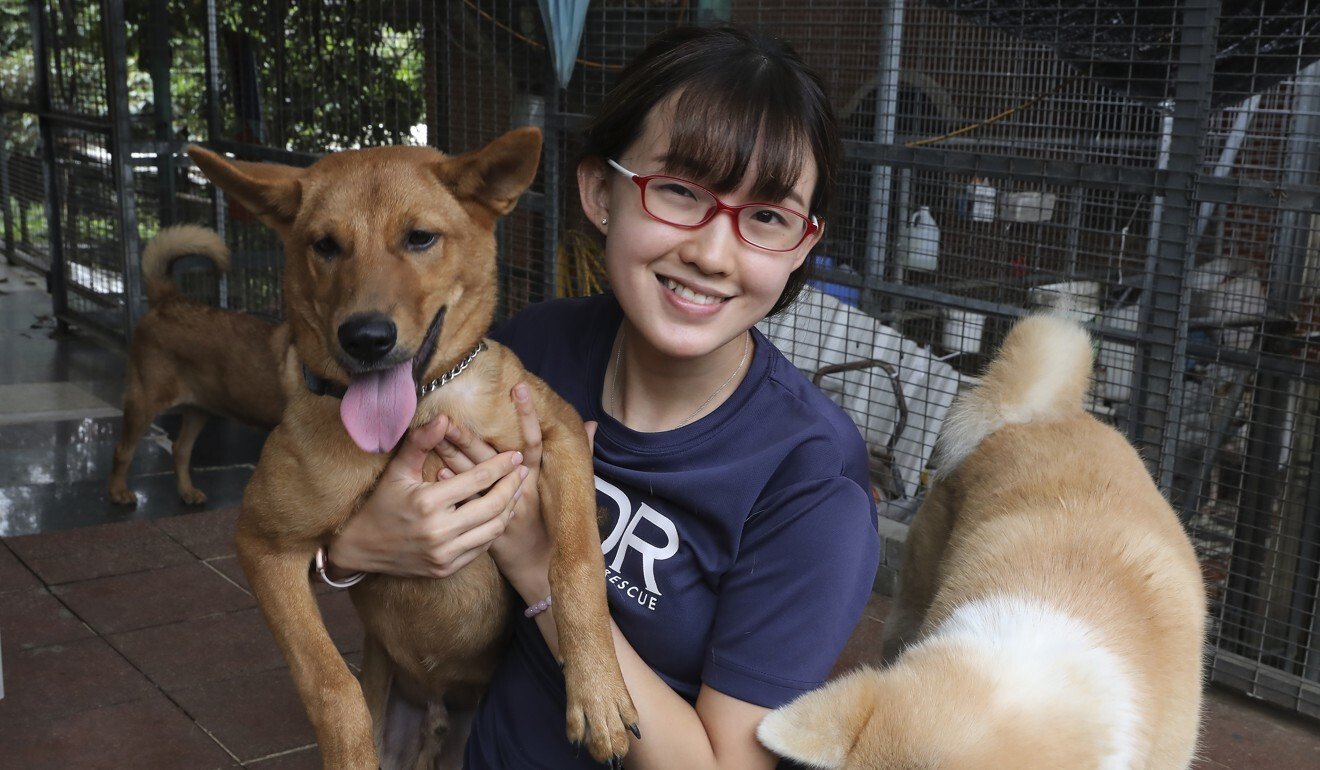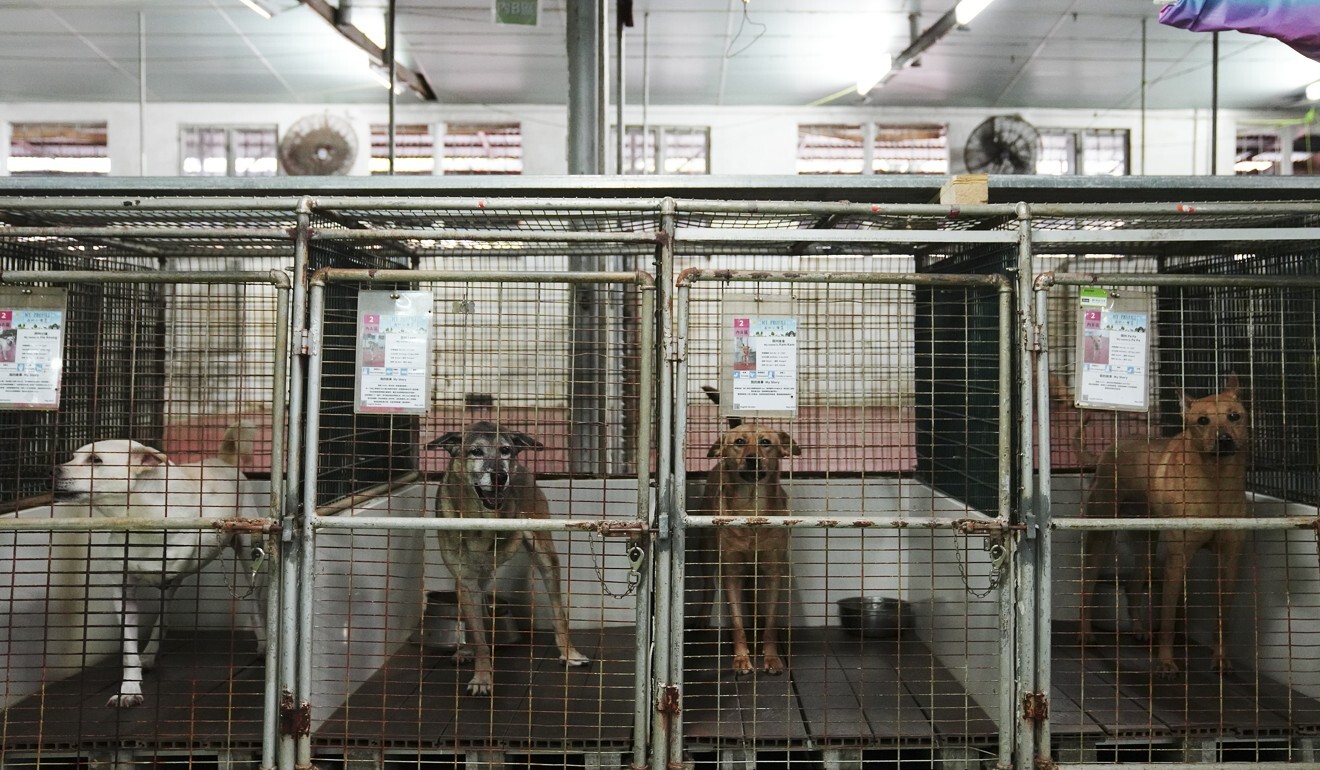
More animals dumped, abused amid Covid-19 pandemic in Hong Kong as owners leave or say they can’t afford to keep pets
- Police dealt with 34 cases of suspected cruelty to animals, arrested 20 in first half of 2020
- Animal welfare groups record more abandoned animals; rise in number of owners giving up pets
The brown mongrel pup was curled up in a carton discarded at a waste collection point in Yuen Long when animal rescuers from the Society for Abandoned Animals (SAA) found her.
She was malnourished and unable to walk because she was born with her hind legs crossed, says El Chan Suk-kuen, founder of the Yuen Long-based animal shelter.
“It was discarded as rubbish. That was cruel,” Chan says.
For the past month the charity has been taking care of the two-month-old mixed breed female, which they named Willy. It is also preparing Willy for a surgery so she can walk.
Animal rescue groups and shelters say the Covid-19 pandemic has led to a rise in the number of abandoned and abused animals, as owners left Hong Kong or were struggling financially.

Statistics from the Agriculture, Fisheries and Conservation Department (AFCD) show that 888 animals, including 419 dogs, 45 cats as well as rabbits, hamsters, guinea pigs, rats, reptiles and others, were given up by owners to the department during the first nine months of this year, compared to 818 over the whole of last year.
The department rounded up 1,395 stray animals, including 452 dogs and 159 cats, from January to September. It caught 2,300 strays last year.
The department first tries to locate the owners of stray animals and wait for them to be reclaimed. Unclaimed animals in good health are transferred to animal welfare organisations, while those determined not suitable for adoption are euthanised.
A total of 264 animals were reclaimed, 744 were rehomed, and 864 were euthanised from January to September this year.
Humans can stay at home doing other things, but dogs cannot
Stuck indoors, dogs become restless
Eva Sit Ngai-man, communications manager at the Hong Kong Dog Rescue (HKDR), an NGO founded in 2003 to save homeless and unwanted dogs, mostly from the AFCD, says it has received more abandoned dogs this year, on average 10 more a month than previously. The animal shelter receives about 500 abandoned dogs a year.
Sit says some owners, fearful of being infected by the coronavirus, stopped walking their dogs and that affected the animals’ physical and mental health.
Some dogs become restless from staying indoors for too long, and start jumping, barking, biting furniture and sometimes hurting their owners accidentally too.
“Humans can stay at home doing other things, but dogs cannot. When dogs become agitated and develop behavioural problems, owners usually blame the dogs,” she says, adding that some owners beat or abandon the animals as punishment.
SAA’s Chan says her shelter has been taking in four or five abandoned animals a month during the pandemic. Previously, it mainly received a couple of inquiries each month about abandonment.
There are about 200 animals, mostly dogs and cats, as well as some turtles and rabbits, at the 20,000 sq ft shelter.

Police statistics show there were 34 cases of cruelty to animals and 20 arrests in the first half of this year, compared to 60 cases and 36 arrests over the whole of last year.
Last month, a 67-year-old man was arrested for animal cruelty a day after he was seen removing a dead dog’s innards close to Mai Po Lung Tsuen, a village near Yuen Long. He was suspected of wanting to eat the dog, but denied it.
In a separate case on October 15, a newborn mongrel was found abandoned in a rubbish bin in Yuen Long with its mouth and legs bound with duct tape. Police listed the case as cruelty to animals and are investigating, but no arrest has been made.
Under the Prevention of Cruelty to Animals Ordinance, cruelty to animals carries a maximum penalty of a fine of HK$200,000 (US$25,792) and imprisonment for three years in Hong Kong.
‘A responsibility for life’
Although more animals have been found abandoned and abused this year, the pandemic has disrupted animal services.
SAA suspended its adoption service for most of this year to reduce the risks of infection from visitors to the shelter, and also stopped home visits by staff to evaluate the suitability of adopters. Since resuming the service a few weeks ago, three dogs and one cat have been adopted, with 10 applications in progress.
HKDR’s Sit says the number of volunteers who walk the dogs has halved to about 50 during the pandemic, and training for newcomers has been disrupted.
Many pet owners who leave Hong Kong take their pets with them, but fewer animals have been transported overseas this year because of the pandemic.
Dr Matthew Murdoch, a veterinary surgeon and director of Ferndale Kennels and Cattery, a Hong Kong-based pet transport company, says: “Airlines have cut the number of flights during the pandemic and some have stopped accepting animals.” The charge for flying animals as cargo has surged by as much as five times, he says.

With international pet relocation procedures becoming more complex too, the company suspended transporting exotic pets such as snakes two months ago.
“There are so many complicated things that normal, simple work becomes so complex,” he says. “The whole process is delayed.”
The travel restrictions might have led some to attempt smuggling animals illegally. In August, 15 cats and dogs washed up dead on Hong Kong beaches and were believed to have been dumped by suspected smugglers. On November 3, police found two cages containing the carcasses of a dog and two cats on a beach on Lantau Island.
With the pandemic unlikely to be over soon, Dr Fiona Woodhouse, deputy director at the Society for the Prevention of Cruelty to Animals (SPCA), says the government and animal welfare organisations should keep up efforts to ensure animal welfare.
“We need to continue to remind people that their animals are their responsibility,” she says. “It is a responsibility for life.”
Having seen a slight increase in the number of owners citing financial difficulties when giving up their animals this year, SPCA started a pet food assistance programme, providing free food for up to four dogs or cats for each family for one to two months from September to December.
A silver lining: more adoptions
There has also been a silver lining, as the number of animal adoptions has gone up.
HKDR’s Sit says her group usually records about 40 dog adoptions a month, but the number went up by almost a third from April to June, when many people were working from home. The number has gone back to normal now.
She says small dogs, and purebred dogs such as golden retrievers and Labradors, are most popular, while old mongrels are harder to rehome.
SAA has received about 60 adoption inquiries every month during the pandemic, compared to less than 10 inquiries previously, according to its founder Chan.
Hongkonger Joanne Lee and her American husband Tom Honeycutt adopted their second dog in April from HKDR, a 2.5-year-old black male mongrel they named Andre.

They got their first dog, a seven-year-old mongrel named Hailey, from a friend who left Hong Kong for the United States in 2018.
Lee, a 32-year-old recruiter, says she and her husband, a 37-year-old management consultant, used to travel frequently for work, but found themselves spending more time at home in Shek O during the pandemic.
“Because of the pandemic this year, we are working from home. So, we figured it is a good time to adopt a second dog.”
Honeycutt says their two dogs have brightened their stay-at-home experience in this difficult time.
“Every now and then when I’m in a Zoom meeting, they will come to me and then go back to sleep. It is a good distraction and a nice way to break up a day,” he says. “They have helped us get through the toughest part of it by just being here.”
Rescued puppy Willy, meanwhile, underwent her first surgery to fix her deformed hind legs on November 4. The surgery went well, but it will have to go through a few more operations, Chan says.
“We hope that it will be able to walk and find a new home,” Chan says.

